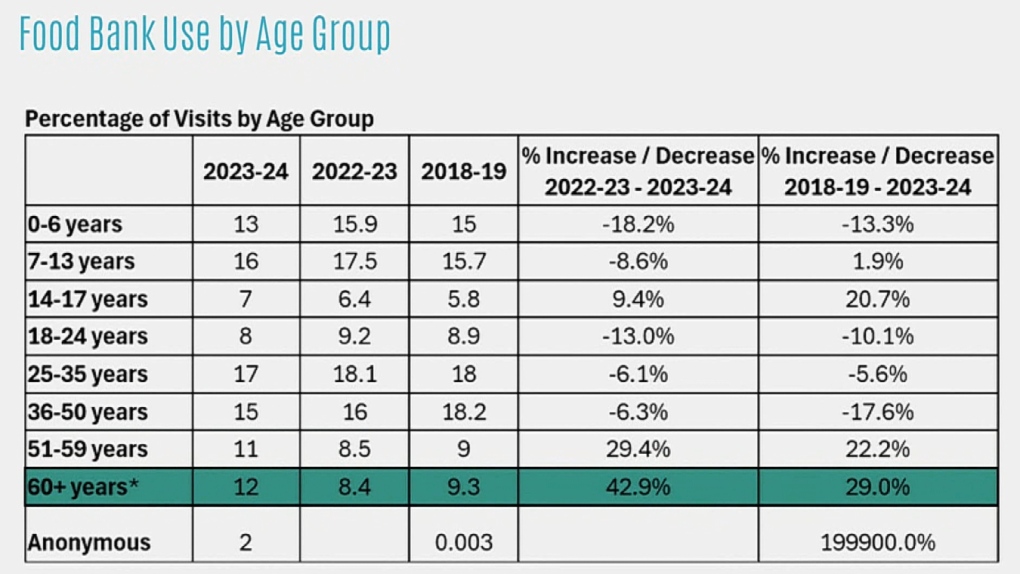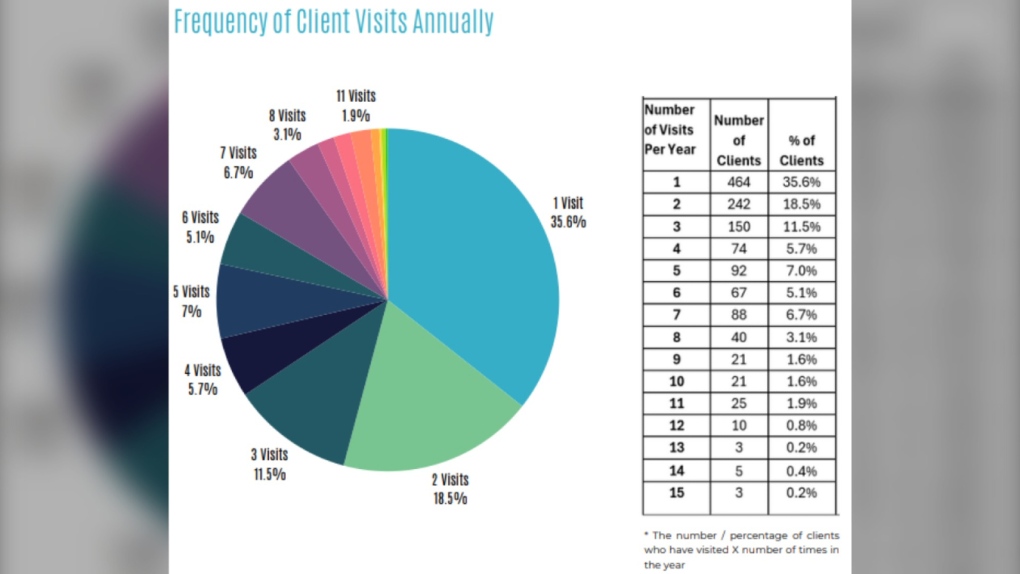Manitoulin Island also seeing increase in food bank usage
More than a million people living in Ontario visited a food bank in the last year as food prices soared across the province, according to new data released last week by Feed Ontario.
 A volunteer takes a food delivery from Ontario’s Second Harvest on March 18, 2020 ahead of a weekly food bank service. (Chris Young/The Canadian Press)
A volunteer takes a food delivery from Ontario’s Second Harvest on March 18, 2020 ahead of a weekly food bank service. (Chris Young/The Canadian Press)
The problem is not just impacting urban centres it is also affecting rural communities – including those in northern Ontario.
Manitoulin Family Resources’ annual Hunger Report found it is seeing 7 per cent more clients over the last year – on top of the previous year’s 37 per cent jump.
The report indicates the Manitoulin Family Resources (MFR) Food Bank in Mindemoya served a total of 4,588 individuals or 1,635 households from April 1, 2023 to March 31, 2024 – a 7 per cent increase over 2022-2023 numbers and a 46.2 per cent increase from pre-pandemic times (2018-2019 numbers.)
Wiikwemkoong and M'Chigeeng are two of the hardest-hit communities according to the report’s author – who also found that approximately one-third of food bank users on the Island were children or youth.
The report also marks a significant increase in the number of seniors using the food bank.
 A chart outlining increases and decreases of usage of the Manitoulin Family Resources Food Bank over the last few years by age. (Image credit: CTV News Northern Ontario | Data provided by Manitoulin Family Resources)
A chart outlining increases and decreases of usage of the Manitoulin Family Resources Food Bank over the last few years by age. (Image credit: CTV News Northern Ontario | Data provided by Manitoulin Family Resources)
“Although it is available to them once every 4-weeks, many of our food bank clients do not require emergency food support every month,” reads the report.
“In fact, over half of our clients required support only once or twice in the 2023-2024 year. Many of our clients live paycheck to paycheck. They are able to make ends meet most months, but are unable to withstand unexpected expenses.”
 A chart outlining the number of times clients made use of the Manitoulin Family Resources Food Bank from April 1, 2023 to March 31, 2024. (Manitoulin Family Resources)
A chart outlining the number of times clients made use of the Manitoulin Family Resources Food Bank from April 1, 2023 to March 31, 2024. (Manitoulin Family Resources)
Family Resources also noted that 28 per cent of visitors last year were first-time food bank users.
"Yes it's really difficult and I find these individuals are often really embarrassed, they feel it's a personal failing that they aren't able to stretch it any further,” said Vanessa Glasby, MFR’s food security program coordinator.
“I just reiterate to them, everybody's coming by, everybody's finding it difficult right now."
 Vanessa Glasby, Manitoulin Family Resources’ food security program coordinator speaks with CTV News in September 2024 following the release of the organization's annual Hungry Report. (Ian Campbell/CTV News Northern Ontario)
Vanessa Glasby, Manitoulin Family Resources’ food security program coordinator speaks with CTV News in September 2024 following the release of the organization's annual Hungry Report. (Ian Campbell/CTV News Northern Ontario)
Decrease in donations
Food banks on Manitoulin Island are also reporting a decrease in donations.
“Although our community is very supportive of our work, especially during our Christmas Hamper Campaign, we simply do not receive enough donations to feed everyone who needs it,” reads the report.
“We spend many thousands of dollars each month on food items, excluding items we receive through Feed Ontario’s Full Shelves and Smarter Needs Allocation Programs, as these items are provided to us ‘free’ of cost through our membership in Feed Ontario.”
According to Feed Ontario, 1 in 7 food banks in the province purchase 20 per cent or more of the food they distribute to their clients – MFR is one of these food banks.
“We purchase an estimated 49.3 per cent of the food we distribute,” said MFR officials.
Glasby told CTV News that it is a similar story for every food bank in the country right now.
Not keeping up
The food security program coordinator said things like wages and social assistance are not keeping up with inflation and the cost of living.
Social assistance remains the primary source of income for the majority of food bank visitors in Ontario 26 per cent of food bank visitors rely on Ontario Works as their primary source of income and 28 per cent rely on the Ontario Disability Support Program.
“At our food bank, 30.2 per cent of visitors rely on Ontario Works, and 21.9 per cent rely on ODSP,” said MFR officials.
“Interestingly, these rates are lower than what our food bank saw in 2022-2023 or 2018-2019, but we have seen simultaneous increases in rates of employed individuals and pensioners requesting food support.”
Manitoulin Family Resources’ full Hunger Report can be viewed here.
CTVNews.ca Top Stories

Donald Trump says he urged Wayne Gretzky to run for prime minister in Christmas visit
U.S. president-elect Donald Trump says he told Canadian hockey legend Wayne Gretzky he should run for prime minister during a Christmas visit but adds that the athlete declined interest in politics.
Historical mysteries solved by science in 2024
This year, scientists were able to pull back the curtain on mysteries surrounding figures across history, both known and unknown, to reveal more about their unique stories.
King Charles III focuses Christmas message on healthcare workers in year marked by royal illnesses
King Charles III used his annual Christmas message Wednesday to hail the selflessness of those who have cared for him and the Princess of Wales this year, after both were diagnosed with cancer.
Mother-daughter duo pursuing university dreams at the same time
For one University of Windsor student, what is typically a chance to gain independence from her parents has become a chance to spend more time with her biggest cheerleader — her mom.
Thousands without power on Christmas as winds, rain continue in B.C. coastal areas
Thousands of people in British Columbia are without power on Christmas Day as ongoing rainfall and strong winds collapse power lines, disrupt travel and toss around holiday decorations.
Ho! Ho! HOLY that's cold! Montreal boogie boarder in Santa suit hits St. Lawrence waters
Montreal body surfer Carlos Hebert-Plante boogie boards all year round, and donned a Santa Claus suit to hit the water on Christmas Day in -14 degree Celsius weather.
Canadian activist accuses Hong Kong of meddling, but is proud of reward for arrest
A Vancouver-based activist is accusing Hong Kong authorities of meddling in Canada’s internal affairs after police in the Chinese territory issued a warrant for his arrest.
New York taxi driver hits 6 pedestrians, 3 taken to hospital, police say
A taxicab hit six pedestrians in midtown Manhattan on Wednesday, police said, with three people — including a 9-year-old boy — transported to hospitals for their injuries.
Azerbaijani airliner crashes in Kazakhstan, killing 38 with 29 survivors, officials say
An Azerbaijani airliner with 67 people onboard crashed Wednesday near the Kazakhstani city of Aktau, killing 38 people and leaving 29 survivors, a Kazakh official said.

































